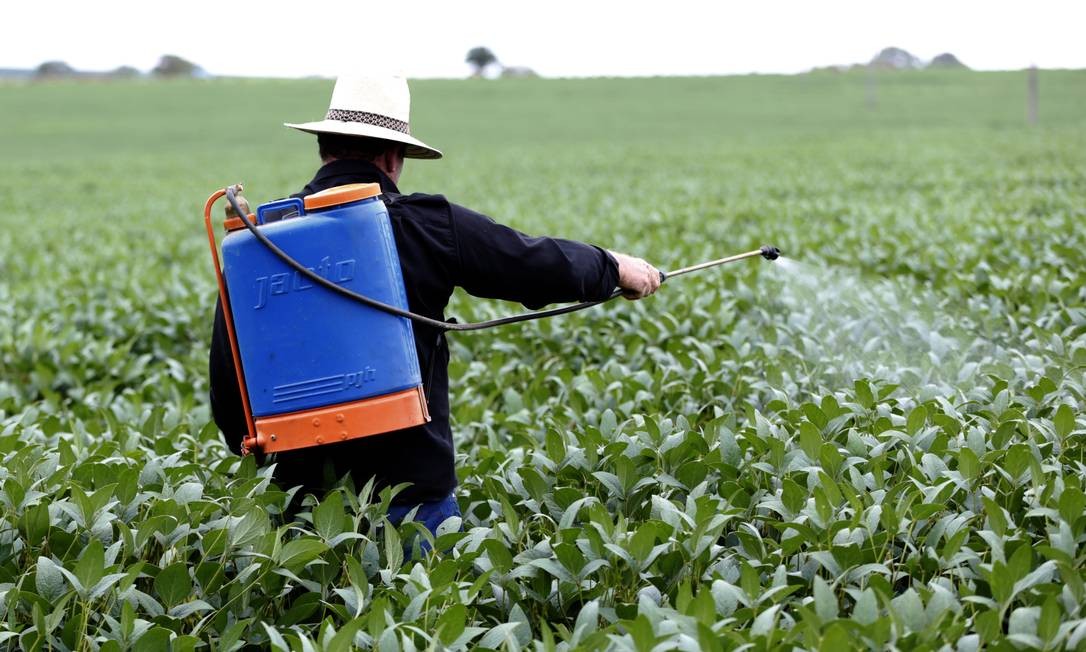According to data from the National Health Surveillance Agency (Anvisa) and the Pesticides Industry Observatory of the Federal University of Paraná, while in the last ten years the global pesticide market grew 93%, the Brazilian market grew 190%. In 2008, Brazil surpassed the United States and assumed the position of the world's largest market for pesticides.
The consumption of pesticides and chemical fertilizers by Brazilian agriculture is growing, being proportional to the increase in monocultures (soybeans, corn, sugarcane and cotton), which are increasingly dependent on chemical inputs.
This increase is related to several factors, such as the expansion of the planting of transgenic soy, which increases the consumption of glyphosate, the growing resistance of weeds, fungi and insects, demanding greater consumption of pesticides and/or the increase in diseases in crops, such as Asian rust on soybeans, which increases the consumption of fungicides. An important stimulus to consumption comes from the decrease in prices and the absurd tax exemption for pesticides, causing farmers to use a greater quantity per hectare.
To make matters worse, 70% of the total volume of pesticides consumed in our crops are in the process of toxicological reassessment by Anvisa (2008) or in a stage of scheduled withdrawal from the market due to the banning decision, which includes glyphosate, endosulfan, methamidophos , 2.4D, parathion-methyl and acephate.
They are active ingredients with a high degree of proven acute toxicity and that cause neurological, reproductive, hormonal dysregulation and even cancer problems (…) [e] Despite being banned in several places around the world, such as the European Union and the United States, there are pressures from agricultural sector to keep these three products (endosulfan, methamidophos and acephate) in Brazil, even after being voluntarily withdrawn in other countries.
Maintaining a strong and healthy immune system is an important part of regaining your vitality. Conditions such as respiratory allergies, skin allergies, intolerances, inflammations, infections, cancer, neurological and hormonal diseases tend to occur in those who experience some type of imbalance that affects the immune system, whether the imbalance results from antibiotic use, stress, diet or any other factor. By ingesting pesticides daily for several years, we are weakening our main defense and health maintenance mechanism. By eating foods that are rich in healthy nutrients and free from pesticides, we give our bodies better chances to strengthen themselves and fight off infections and illnesses.
In addition to stopping the damage, that is, stopping eating pesticides, we need to chase the damage. A recent survey by the Royal Melbourne Institute of Technology found that after just a single week of organic feeding, participants had a lower 90% pesticide count than those who did not consume organic fruits and vegetables.²
Our body is a super power to detox, but we need to give it that chance. What to do if we're on a tight budget, or don't have time or access to an organic fair?
Avoid buying the most contaminated products. When opting for organic, we eat live and nutrient-rich foods. Your health, your children and the planet thanks you. Below is a list of the 8 most and 5 least contaminated products:
Most contaminated foods: Pepper, Strawberry, Cucumber, Lettuce, Beetroot, Carrot, Pineapple, Papaya
Less: onion, mango, cabbage, apple, cabbage
If you want to know more information you can download this for free. book from Abrasco – Brazilian Association of Collective Health, extremely rich in information or watch this documentary "The world according to Monsanto". You might be surprised!
Did you like it? Share!
1- Aries, FF; Rigoto, RM; Augusto, LGS; et al (org.). (2015). Abrasco Dossier: a warning about the impacts of pesticides on health. Rio de Janeiro/São Paulo. Ed. Popular Expression.
2- Oates, L., Cohen, M., Braun, L., Schembri, A., & Taskova, R. (2014). Reduction in urinary organophosphate pesticide metabolites in adults after a week-long organic diet. Environmental Research, 132(0), 105-111.


0 Comments